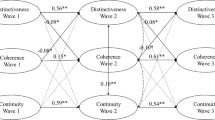Abstract
Three studies that evaluate the reliability and validity of the Extended Version of the Objective Measure of Ego Identity Status (Adams and Grotevant, 1983) are reported. In Studies 1 and 2, college students in Texas and Utah, respectively, completed the identity measure, the Extended Range Vocabulary Test, and the Crowne-Marlowe Social Desirability Scale and released achievement results from their college records. The identity measure was found to have acceptable reliability (both internal consistency and test-retest) and validity (content, factorial, discriminant, and concurrent). In Study 3, scale scores from the objective identity measure correlated in the predicted pattern with ratings of identity exploration and commitment made from the Ego Identity Interview. Although the objective measure is not intended to replace the interview, it would appear to be useful in a number of situations where administration of the interview is impractical.
Similar content being viewed by others
References
Adams, G. R., and Grotevant, H. D. (1983). Extended Version of the Objective Measure of Ego Identity Status. (Available from G. R. Adams.)
Adams, G. R., and Jones, R. M. (1983). Female adolescents' identity development: Age comparisons and perceived child-rearing experience.Dev. Psychol. 19: 249–256.
Adams, G. R., Shea, J., and Fitch, S. A. (1979). Toward the development of an objective assessment of ego-identity status.J. Youth Adoles. 8: 223–237.
Adams, G. R., Ryan, J. H., Hoffman, J. J., Dobson, W. R., and Nielson, E. C. (1984). Ego identity status, conformity behavior and personality in late adolescence.J. Personal. Soc. Psychol. 47: 1091–1104.
Bourne, E. (1978). The state of research on ego identity: A review and appraisal. I.J. Youth Adoles. 7: 223–252.
Coleman, J. C. (1978). Current contradictions in adolescent theory.J. Youth Adoles. 7: 1–11.
Constantinople, A. (1969). An Eriksonian measure of personality development in college students.Dev. Psychol. 1: 357–372.
Crowne, D. P., and Marlowe, D. (1960). A new scale of social desirability independent of psychopathology.J. Consult. Psychol. 24: 349–354.
Ekstrom, R. B., French, J. W., Harman, H. H., and Derman, D. (1976).Manual for Kit of Factor-Referenced Cognitive Tests Educational Testing Service, Princeton, N.J.
Enright, R. D., Lapsley, D. K., Cullen, J., and Lallensack, M. (1983). A psychometric examination of Rasmussen's ego identity scale.Int. J. Behav. Dev. 6: 89–103.
Erikson, E. H. (1968).Identity: Youth and Crisis Norton, New York.
Grotevant, H. D., and Cooper, C. R. (1981). Assessing adolescent identity in the areas of occupation, religion, politics, friendship, dating, and sex roles: Manual for administration and coding of the interview.JSAS Cat. Select. Docu. Psychol. 11: 52 (ms No. 2295).
Grotevant, H. D., and Thorbecke, W. L. (1982). Sex differences in styles of occupational identity formation in late adolescence.Dev. Psychol. 18: 396–405.
Grotevant, H. D., Thorbecke, W. L., and Meyer, M. L. (1982). An extension of Marcia's identity status interview into the interpersonal domain.J. Youth Adoles. 11: 33–47.
Harren, V. A. (1979). A model of career decision-making for college students.J. Vocat. Behav. 14: 119–133.
Holland, J. L. (1973).Making Vocational Choices: A Theory of Careers Prentice-Hall, Englewood Cliffs, N.J.
Jordaan, J. P. (1963). Exploratory behavior: The formation of self and occupational concepts. In Super, D. E., Starishevsky, R., Matlin, N., and Jordaan, J. P. (eds.),Career Development: Self-Concept Theory College Entrance Examination Board, Princeton, N.J.
Marcia, J. E. (1966). Development and validation of ego identity status.J. Personal. Soc. Psychol. 3: 551–558.
Marcia, J. E. (1980). Identity in adolescence. In Adelson, J. (ed.),Handbook of Adolescent Psychology Wiley, New York, pp. 159–187.
Marcia, J. E. (1981). Adolescent identity formation: Conceptual and methodological issues. Comments from discussion session held at the meeting of the Society for Research in Child Development, Boston.
Matteson, D. R. (1974).Alienation vs. Exploration and Commitment: Personality and Family Correlates of Adolescent Identity Statuses, Rapport fra Projekt for Ungdumsfurskning, Copenhagen, Denmark.
Nie, N. H., Hull, C. H., Jenkins, J. G., Steinbrenner, K., and Bent, D. H. (1975).Statistical Packages for the Social Sciences 2nd ed., McGraw-Hill, New York.
Peck, R. F. (1980).Individual Styles of Coping. (Available from R. F. Peck, Department of Educational Psychology, University of Texas at Austin, Austin, Texas 78712.)
Rasmussen, J. E. (1964). The relationship of ego identity to psychosocial effectiveness.Psychol. Rep. 15: 815–825.
Read, D., Adams, G. R., and Dobson, W. R. (1984). Ego-identity, personality and social influence style.J. Personal. Soc. Psychol. 46: 169–177.
Simmons, D. (1970). Development of an objective measure of identity achievement status.J. Project. Tech. Personal. Assess. 34: 241–244.
Thorbecke, W., and Grotevant, H. D. (1982). Gender differences in adolescent interpersonal identity formation.J. Youth Adoles. 11: 479–492.
Yatim, D. (1982).Ego-Identity Formation Process Among Male Late Adolescents and Male Young Adults Unpublished thesis, Fakultas Psikologi, Universitas Gadjah Mada, Yogyakarta, Indonesia.
Author information
Authors and Affiliations
Additional information
We gratefully acknowledge the assistance of Dan Tousley in the data collection and data analysis phases of this research. Data collection and analyses for Study 3 were provided by grants from the Hogg Foundation for Mental Health, the National Institute of Child Health and Human Development, the University of Texas Research Institute, and the University of Texas Institute of Human Development and Family Studies to Harold D. Grotevant and Catherine Cooper, Co-Principal Investigators.
Study 2 was supported by the W144 regional research grant on The Development of Social Competency in Children with funding from the United States Department of Agriculture and the Utah State University Agricultural Experiment Station, directed by Gerald Adams.
Received Ph.D. in child psychology from the University of Minnesota. Research interests concern the contribution of family relationships to personality and identity development in adolescence.
Received Ph.D. from The Pennsylvania State University. Research interests include adolescent social and personality development.
Rights and permissions
About this article
Cite this article
Grotevant, H.D., Adams, G.R. Development of an objective measure to assess ego identity in adolescence: Validation and replication. J Youth Adolescence 13, 419–438 (1984). https://doi.org/10.1007/BF02088639
Received:
Accepted:
Issue Date:
DOI: https://doi.org/10.1007/BF02088639



